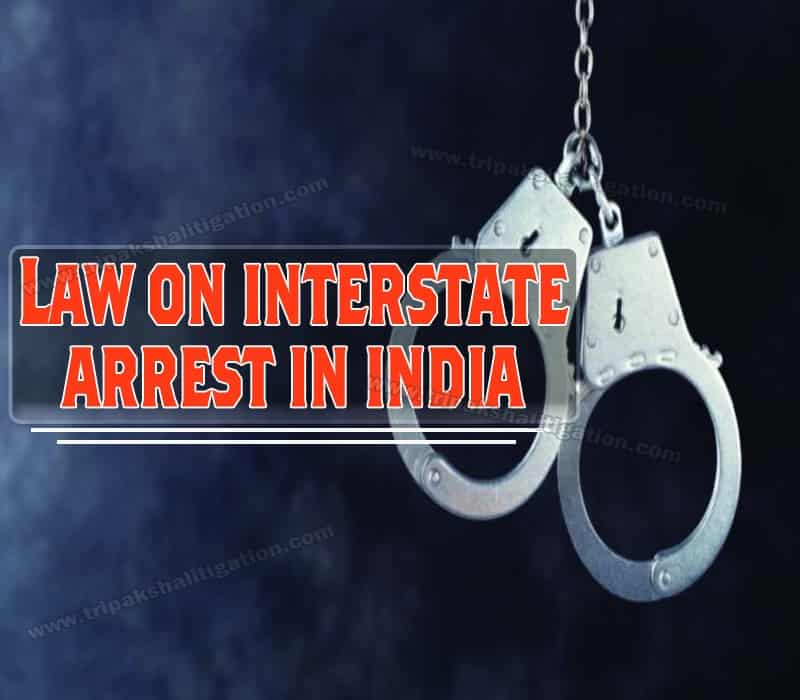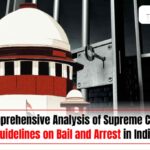Introduction
The Farlex legal dictionary defines the term ‘arrest’ as taking or keeping a person in custody by legal authority, especially in response to a criminal charge[i]. The expression ‘interstate arrest by police’ means when the accused person is arrested by the police of one state and the offence is committed in some other state. However, this kind of investigation or arrest is not constitutionally valid.
As per the law, the police can arrest or investigate an accused lying within the boundaries of their state. For arresting an accused of some other state, the police force needs to communicate with the police force of that particular state where the accused is and accordingly immediate action shall be taken.
Guidelines for inter-state police arrest[ii]
In the case of Sandeep Kumar v. the State (Government of NCT of Delhi)[iii], a reasonable foundation was laid regarding interstate arrest by the police department of one state arresting the accused in some other state or union territory (UT).
Authentic foundation
The High Court of Delhi was dealing with a Habeas Corpus Writ Petition filed by a man seeking the arrival of his wife after she was removed by the Uttar Pradesh (UP) police from their home. The action was taken against the woman who had converted her religion from Islam to Hindu before her marriage to a Hindu. Her family protested the marriage and her sibling who recorded a grievance with the Ghaziabad police stated her sister had disappeared[iv].
The lady was sent back to her family and the Delhi High Court questioned why she was “handed over” to her family. It was noticed by the court that the lady was an adult and that she married of her free will. The High Court observed that the Delhi police had no insinuation to visit the Uttar Pradesh (UP) police.
Disciplinary action against cops
The Delhi High Court has ordered to initiate disciplinary action against the involved cops. The Court further ordered that Rs 50,000 each be granted as remuneration to the applicant and his wife. The DGP of the UP police was ordered to keep in touch with the said couple to ensure their safety.
The Court issued the following guidelines for Police to follow, Magistrates to ensure, and other relevant instructions to be abided:
Police obligation
- Prior written permission must be taken from the superior officer to go out of the state or UT for carrying out the investigation.
- If the police need to arrest the accused in another state, he must write facts and reasons to satisfy why the arrest is necessary. The police officer must attempt to get an arrest or search warrant from the magistrate having jurisdiction. In an emergency, the accused can be arrested without a warrant.
- Before going out of the state, a detailed entry in the Daily Diary must be maintained by the police officer. The diary must contain date and time of departure; name of the police officials and private officials going with him; vehicle number; the purpose of visit; specific place(s) that is/are to be visited.
- A lady police officer should be the part of a team if the arrestee (the person to be arrested) is a female.
- The officers should have their ID cards, and they should be in uniform. They must carry accurate, clear and visible name tags with their designations on them.
- Before visiting the other state, the police officer must contact the local police in whose jurisdiction he has to conduct the investigation.
- After reaching the destination, the police officer must seek assistance and cooperation from the concerned police station. The Station House Officer must provide legal assistance to the other state’s police, and an entry must be made at the said police station.
- After reaching the investigation place, the officer must follow the guidelines provisioned u/s 100 of the CrPC.
- The procedure given u/s 41A, 41B, 50 & 51 of CrPC must be abided and the guidelines given in DK Basu Case[v] must be followed strictly.
- An opportunity to consult an advocate must be given to the arrested person before he is taken out of the state and reasons for arrest must be informed to the accused.
- Before returning, the police officer must visit the local police station, and an entry in the Daily Diary must be made indicating the name of the persons being taken out of the state. Articles (things) must also be mentioned in the Daily Diary if any are recovered. And, the victim’s name must also be given.
- Transit remand must be obtained after producing the arrestee in front of the nearest magistrate. And the arrestee must be produced in front of the magistrate within 24 hours, etc[vi].
Obligations upon Magistrates
- The Magistrate considering a travel remand application as provided under Article 22 (1) of the Indian Constitution. It states that the arrested person must be informed about the grounds of arrest.
- The Magistrate must ensure that the arrested accused is not denied the right to seek legal advice and appoint counsel. The Magistrate should ask the same from the accused persons.
Other bearings and relevant guidelines
- As per the provisions of Section 41(1)(c) of the CrPC the control rooms must be set up in every region.
- The cop has to record each procedure at the spot and must set up a ‘capture notice’ including time, date of capture, and name of the connection/companion to whom suggestion of capture has been given.
- The accused person is permitted to take along with him/ her friend or relative till the time he is delivered to the Magistrate having the jurisdiction.
- The 24 hours’ time as provisioned u/s 57 of the CrPC is to be practised as far as possible.
- The Investigating Officer (IO) should keep a thorough case journal showing the examination completed by him.
- Appropriate rules for cops to be delivered by the Ministry of Home Affairs (MHA), Central Govt. /Commissioner of Police (CP).
- The public examiner ought to give expected help to the cop visiting his State at the hour of looking for travel remand.
Interstate investigation and law: Tajinder Bagga’s arrest[vii]
Recently, the Punjab Police arrested Tajinder Pal Singh Bagga who is a Delhi BJP spokesperson. He was arrested from his residence in Delhi as a case was registered against him in Mohali. A Local Court in Punjab (SAS Nagar) has issued a non-bailable arrest warrant against BJP Leader Tajinder Pal Singh Bagga[viii].
The High Court of Punjab and Haryana stayed the arrest of Tajinder Pal Singh Bagga till July 6. Justice Harinder Singh Sidhu was hearing Bagga’s plea against an order of the Local Court in Punjab (SAS Nagar) issuing a non-bailable warrant against him for the case registered against him under Section(s) 153-A, 505, 505 (2), 506 of IPC. However, the investigations shall continue[ix].
Conclusion
Inter-state arrests by police are legal if it is in the notice of the other state police. As mentioned above, set rules and guidelines must be followed strictly while conducting an inter-state arrest. Hence, we can say that interstate investigation may be conducted and arrest of the accused person be made. It is the obligation of the police officers, Magistrates to abide by the guidelines issued by the Court in the Sandeep Kumar Case (Supra).
[i] https://www.writinglaw.com/inter-state-arrest-and-guidelines/
[ii] https://www.writinglaw.com/inter-state-arrest-and-guidelines/
[iii] W.P (Crl.) No.2189/2018
[iv] https://www.barandbench.com/news/litigation/cannot-condone-lawlessness-by-police-delhi-hc-orders-execution-of-guidelines-on-inter-state-investigation-and-arrest-read-guidelines
[v] D.K. Basu v. State of West Bengal (AIR 1997 SC 610)
[vi]https://www.livelaw.in/know-the-law/inter-state-arrest-transit-remand-right-to-legal-representation-170188?infinitescroll=1
[vii] https://www.indiatoday.in/law/story/tajinder-bagga-arrest-what-does-the-law-say-about-interstate-investigation-1946381-2022-05-06?utm_source=newsshowcase&utm_medium=gnews&utm_campaign=CDAqEAgAKgcICjCi3twKMPzEzgEw3-BM&utm_content=rundown
[viii] https://www.livelaw.in/top-stories/breaking-punjab-and-haryana-high-court-stays-arrest-of-bjp-leader-tajinder-bagga-198562
[ix] https://www.livelaw.in/news-updates/punjab-and-haryana-high-court-stays-bjp-leader-tajinder-bagga-arrest-july-5-no-stay-investigation-198719








